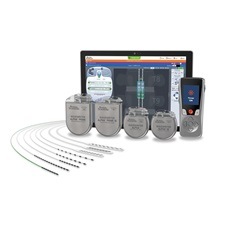
Boston Scientific Corporation has announced positive one-year results from the SOLIS randomised controlled trial, demonstrating sustained pain relief using its WaveWriter Alpha spinal cord stimulation (SCS) systems for the treatment of non-surgical back pain (NSBP), presented at the recent 2024 North American Neuromodulation Society (NANS) annual meeting (18–21 January, Las Vegas, USA).
“Continued positive results from the SOLIS study illustrate the need for early and effective pain treatment when just the standard of care is not enough,” said Jim Cassidy, president, Neuromodulation, Boston Scientific. “Backed by consistently strong clinical evidence, our transformative pain management solutions help individualise care and improve the quality of life for the many people living with chronic pain today.”
Outcomes from the SOLIS study, which had met its primary endpoint, were highlighted in a late-breaking data presentation by James North (Carolinas Pain Institute and Center for Clinical Research, Winston-Salem, USA). Key findings from the study (n=128 randomised subjects) are as follows:
- At the primary endpoint interval, 90% of patients treated with WaveWriter systems reported significant pain relief of 50% or greater without an increase in opioids, compared with 8% of patients treated with conventional medical management (CMM) alone (p<0.0001)
- At one year, 84% of patients treated with WaveWriter systems reported significant pain relief of 50% or greater and sustained improvement in their ability to participate in activities of daily living, with a mean 25-point improvement in disability, as measured by the Oswestry Disability Index (ODI)
- CMM patients who subsequently chose to receive SCS therapy achieved significant improvement in pain and disability at a one-year interval, consistent with subjects in the SCS arm; 85% of crossover subjects reported a 50% or greater reduction in pain with a mean 30-point improvement in disability, as measured by ODI
In addition to these findings, a global, multicentre study of prospectively enrolled patients utilising SCS for painful diabetic peripheral neuropathy (DPN) was also delivered at NANS 2024.
Real-world outcomes from the study (n=43 patients) demonstrated a profound reduction in pain and high rates of patient improvement across all long-term timepoints using SCS therapy for patients with DPN, according to a Boston Scientific press release.
At this study’s two-year follow-up, 81% of patients reported a 50% or greater reduction in pain, while a high level of improvement and treatment satisfaction was reported as per patient global impression of change (PGIC) measures at up to three years’ follow-up as well.
Boston Scientific’s recent release further notes clinical outcomes using Fast-acting sub-perception-based therapy (FAST), relaying that multiple prospective and real-world studies from Europe and the USA demonstrated significant and sustained pain relief using the company’s proprietary FAST technology—which is designed to provide immediate, paraesthesia-free pain relief.
At approximately one year of follow-up across these ongoing studies, consistent improvement has been observed, with at least 88% of SCS patients reporting 50% or greater pain relief. Evaluation of 311 enrolled patients is ongoing, the release concludes.









